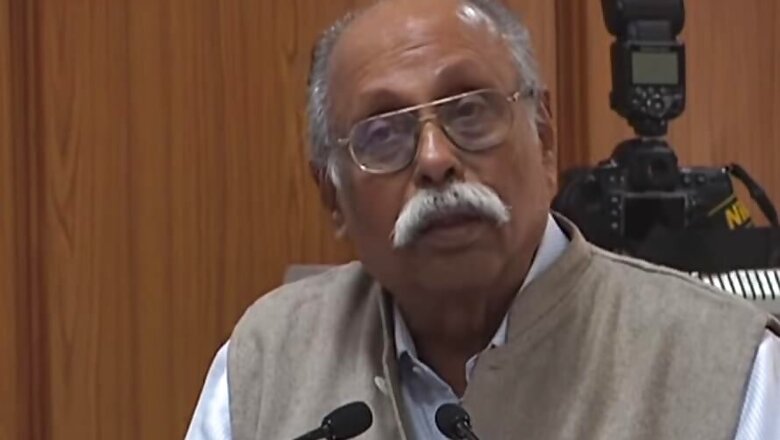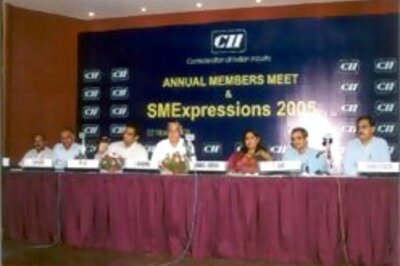
views
My opportunity to work with and for PS Krishnan came on account of my background of “wasting” my youth years for radical social causes.
I was introduced to him in the early 1990s by one officer who was similarly radically oriented, at that time working at the deputy-secretary level in the Ambedkar Foundation, which was established by the initiative of Krishnan when he was secretary to Government of India in the-then ministry of welfare.
I started working with PSK, as Mr Krishnan was referred to by almost all who were close to him, as his personal assistant in 1993 when he was chosen by the-then government as the first member-secretary of the National Commission for Backward Classes (NCBC).
Immediately thereafter, I started getting impressed by his qualities of personal integrity, sincerity, utmost devotion to work and meticulousness. He was a disciplinarian and was considered a “tough task master” by all officials and staff in the office. His work style was not routine official work. He proactively created whatever work and tasks to be accomplished by the NCBC in order to ensure that all the genuine backward communities throughout the country were included in the list of backward classes so that they start getting reservation and other benefits that they deserve.
As he was strict and adamant towards the work to be done, he inspired awe-with-respect among officials and staff.
I travelled with him to many parts of the country for the public hearings in which members of different castes would come. The way he elicited through his queries to them all the relevant information about their castes – their traditional occupation, present status of their members, their social customs, their education level, the nature of their interactions with other communities, how they were treated by the “upper’ castes, etc – was a great learning experience for me.
In his official work, nobody could exercise any undue influence on him. I knew of some instances when some political personalities had tried to influence him to get some non-backward groups included in the list of backward classes. Impartiality and strict adherence to rules and fairness was his hallmark.
Such was his heart’s full involvement and commitment to the work for the people of disadvantaged social classes that he remembered everyone, who came to him with some grievance, by their name even when they revisited him after a long gap. He was a polyglot and knew most major Indian languages and, therefore, could converse with people easily in their own languages and win their love, respect and affection.
After his term as member-secretary, NCBC came to an end in February 2000, he continued his work of advocacy of social justice and rights of dalits, adivasis and backward classes in his personal capacity without any relaxation. I rejoined him to assist in his work from 2007, when he was appointed honorary adviser by the Andhra Pradesh government to help it extend reservation and other benefits to backward class communities among Muslims of the state.
During the 12 years since then, I never saw him take leave from his obsession with continually writing to leaders in governments – central and different states – on the measures needed for solving different issues of scheduled castes, scheduled tribes and backward classes. He would send copies of his letters to members of these communities and prod them to take up these issues, and also to the media seeking their support.
He strongly believed that the continuous and relentless pressure from all would someday yield results. Sometimes when I would make some pessimist remarks about futility, he would say let us not desist from making efforts. He would use every context and opportunity to raise the issue of empowerment of socially deprived classes. The latest occasion was the recent discourse in the media on economic slowdown. He wrote to the government and in the media that the real solution for strengthening the Indian economy is through increasing demand by making the vast majority of Indians consisting of the dalits, adivasis and backward classes active participants in economic activities and market by way of distribution of land to landless SCs, land-deprived STs and other empowerment measures.
He wanted to pen down his extensive countrywide knowledge and experience relating to the issues of the deprived classes in books for the benefit of future generations. Unfortunately, he could not complete his wish. He mentored many young people among the new generation for the democratic fight for social justice. A young man, who recently graduated from Jamia Millia, Delhi, is one among them, who was with him at Apollo hospital during Krishnan’s last days and he expressed to me his sentiments about PSK as follows: “What a man he was; a non-believer who respected all religions! Krishnan sir’s religion and faith revolved round the philosophy of humanism. He shaped me by teaching the philosophy of equality and honesty. His advice to me was remain focused in making constructive and productive contribution towards the growth of this country…”
(The author worked with PS Krishnan as his secretary. Views expressed are personal.)




















Comments
0 comment